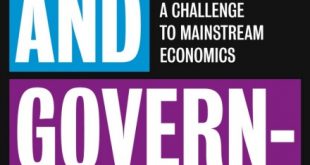LONDON – So British Prime Minister Theresa May lives to fight another day. The Conservative Party in the House of Commons reaffirmed its confidence in her leadership by a far-from-resounding 200-117 vote. It is hard to think of another British prime minister whose leadership has been in such continuous crisis. Not so much an iron lady as a stubborn and dogged one, May has begun another round of effort to extract a few further concessions from European leaders to make her divorce...
Read More »The Case for Compensated Free Trade
Almost all liberals support globalization and oppose economic nationalism. They ignore the mounting evidence that, in its current form, globalization is dangerously incompatible with democracy. In his 2011 book The Globalization Paradox, Harvard’s Dani Rodrik says that the nation-state, democracy, and globalization are mutually irreconcilable: we can have any two, but not all three simultaneously (he calls this a “trilemma”). All over the world, the “nation” has been revolting...
Read More »Speech on the Autumn Statement 2018
My Lords, I welcome the general thrust of the Budget. As the OBR says, it represents the “largest fiscal loosening” since 2010. Noble Lords have suggested that the Chancellor is spending his windfall, but I mistrust the language of “windfalls”. Windfalls are only forecasts of revenue based on forecasts of growth; they are not there under the bed, so to speak, and should be given the credence they deserve—which is very little. Let us put that aside. We are not here to discuss the...
Read More »‘Money Matters’: a Money and Government interview
Robert Skidelsky talks about his new book with Rob Johnson of the Institute for New Economic Thinking. [embedded content] Watch at INET’s website Watch on Facebook Watch on Twitter
Read More »The Brexit Endgame
LONDON – The United Kingdom’s “Remainers,” who still hope to reverse Britain’s decision to leave the European Union, have placarded British cities with a simple question: “Brexit – Is It Worth It?” Well, is it? The answer given by economics is clear: certainly not. In terms of the costs and benefits of leaving, the result of the 2016 Brexit referendum was plainly irrational. And yet economics also clearly shaped the decision. The Brexit propagandists brilliantly channeled palpable...
Read More »Beyond Austerity: The Challenge Facing Labour
This essay, published in the New Statesman, is based on a lecture hosted on 19th September by the Progressive Economy Forum, of which Lord Skidelsky is a Council member. Labour has always been set a higher standard on the economy than the Conservatives: it had to be more orthodox, more competent, more successful to win equal praise or escape equal blame. The reason is not hard to find: created and financed by the trade unions, and committed to the abolition of capitalism, the Labour...
Read More »Good Politics, Bad Economics
LONDON – Bad economics breeds bad politics. The global financial crisis, and the botched recovery thereafter, put wind in the sails of political extremism. Between 2007 and 2016, support for extremist parties in Europe doubled. France’s National Rally (formerly the National Front), Germany’s Alternative für Deutschland (AfD), Italy’s League party, the Freedom Party of Austria (FPÖ), and the Sweden Democrats have all made electoral gains in the past two years. And I haven’t even...
Read More »Lessons for the Left, 1997 – 2018
A lecture given at King’s College London, under the auspices of the Political Economy Forum i. Labour’s Relationship with Keynes Labour has always been set a higher standard on the economy than the Conservatives: they’ve had to be more orthodox, more competent, more successful to win equal praise or escape equal blame. The reason is not hard to find: created and financed by the trade unions, and committed to the abolition of capitalism, the Labour Party faced obvious difficulties in...
Read More »Money and Government: a lecture at the LSE, 17 September 2018
i. Over the weekend, just ten years ago, the investment firm Lehman Bros collapsed, and the world economy collapsed after it. I feel a little reluctant to add to the torrent of words trying to read the runes of this catastrophe for the better management of affairs in the future. But, by chance or cunning, a book of mine, called Money and Government: A challenge to mainstream economics, has just been published. This tries to set the collapse of 2008 in a historical context. It has been...
Read More »Money and Government: A challenge to mainstream economics
The dominant view in economics is that money and government should play only a minor role in economic life. Money, it is claimed, is nothing more than a medium of exchange; and economic outcomes are best left to the ‘invisible hand’ of the market. The view taken in this important new book is that the omnipresence of uncertainty make money and government essential features of any market economy. One reason we need money is because we don’t know what the future will bring. Government –...
Read More » Robert Skidelsky
Robert Skidelsky

